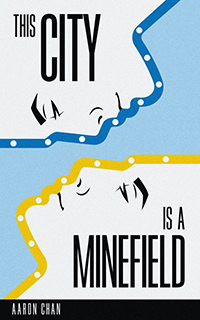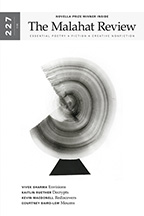Reviews
Nonfiction Review by Ren Iwamoto
Aaron Chan, This City is a Minefield (Hong Kong: Signal 8, 2019). Paperbound, 252 pp., $US18.95.
 This City is a Minefield does not feel like a debut. Chan’s skill as a storyteller in other artistic arenas shines through in this tender and funny book of essays, recollections, and short stories. This City recounts Chan’s life as a gay Chinese man growing up, living and working in
This City is a Minefield does not feel like a debut. Chan’s skill as a storyteller in other artistic arenas shines through in this tender and funny book of essays, recollections, and short stories. This City recounts Chan’s life as a gay Chinese man growing up, living and working in
Vancouver, and everything associated with those axes of identity.
Marginalization is often foregrounded in the text. Chan frequently alludes to 2SLGBTQIA+ representation in media, which he characterizes as rife with meet-cutes and soap opera-like drama. By contrast, his own romantic encounters are often awkward (especially as a young man, and he often laments his lack of a gaydar), highlighting the difficult reality for many queer people of navigating a heterocentric society. Even in a city like Vancouver—which Chan describes so strikingly as to render it a character in and of itself—where the best of Canada’s diversity is showcased, Chan describes a sense of mild, persistent isolation. He feels removed from the LGBT+ community as a Chinese man, and from the Chinese community as a gay man. His sexuality causes considerable tension in his family, especially with his conservative Chinese parents, who view his gayness as somehow both a bad choice and an affliction. “When I think about my time studying Chinese,” Chan writes, “it triggers conflicting emotions: nostalgia mixed with disgust.” To me, this perfectly encapsulates the queer diasporic experience. The simultaneous love, tenderness, removal, and repulsion one feels as they attempt to fit in can be a lifelong struggle, which Chan captures in his memoir.
The tone of This City is mixed— at times humorous, at times serious. The constant tension of racial and sexual othering adds depth to the more serious moments, and heightens the lightness and humor of Chan’s happier snapshots. Although rarely—if ever—laugh-out-loud funny, Chan’s writing often brings a smile to your face in transcribing his text exchanges and inner monologues. The transitions between the text’s multiple moods are not always seamless, which originally struck me as an imperfection. However, I came to appreciate these abrupt shifts. The memoir has the quality of a conversation, and conversations rarely transition perfectly from one mood or topic to the next, an effect compounded by This City’s lack of overarching narrative. Indeed, as I worked my way through the book, imperfection grew to be one of its most compelling qualities. Memoirs, like museums, are often highly curated. Chan’s awkwardness, weirdness, his occasional disconnect from other members of the Chinese and/or queer communities—all lend a deeply human and highly relatable quality to his work. Quoting Brené Brown, Chan writes that “emotional risk, exposure, uncertainty… Vulnerability is our most accurate measurement of courage.” This is the kernel of truth at the centre of This City. Chan unveils himself before the reader, revealing moments of terror and embarrassment, and that is a large part of what makes him so compelling a narrator.
One of the memoir’s most striking features is the short creative piece Chan wrote while in school. In it, the narrator, an id-like shadow self, imagines himself as a separate entity from his body, which he pressures into casual sex with men he meets online. The sex is barely pleasurable and borderline traumatizing, yet the narrator continually forces himself into similar encounters. This dark and glittering shard set in the mosaic of the memoir highlights, amongst other things, the pressures of online
dating and hook-up culture and the stigma of hypersexualization placed upon gay men. It also plays perfect counterpart to later tellings of genuinely tender and meaningful encounters, as in “A Case of Jeff,” a short piece which won subTerrain’s 2013 Lush Triumphant Award.
Chan backs up his experiences of marginalization with academic studies. This isn’t to say that one’s lived experience needs validation by experts; however, the inclusion of such, most notably Mary Diane Plummer’s “Sexual Racism in Gay Communities: Negotiating the Ethnosexual Market” (2007), fulfills the double duty of providing intellectual robustness and subtly reminding readers of their own potential biases. Chan recounts his own peers and friends in the gay community denying sexual racism, calling it a “preference” without further reflection, effectively gaslighting Chan (and by extension, the many other gay men of colour who are flatly rejected due to race). By including academic work, Chan shores himself up and gently reassures the reader, who may be a gay Asian man like him, that the discrimination they face is real. By quietly refusing to be gaslit despite uncertainty, Chan makes This City both a companion and guiding light.
This City is clearly the work of a seasoned storyteller with a strong point of view. Its episodic style makes it easy to take breaks when the subject matter grows harrowing, and Chan’s sense of humour reminds you that despite one’s marginalizations and life trials, it is possible to find joy in day-to-day life. Rich with sentiment, information, and of course Chan’s life story, it is also relatively brief. The book is easily read over a few days, but I found myself revisiting certain passages to go over them more carefully, a testament to Chan’s ability to build a multi-faceted narrative.
—Ren Iwamoto









